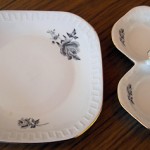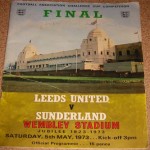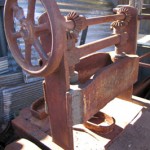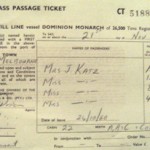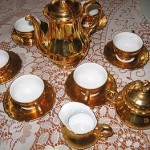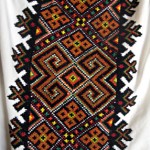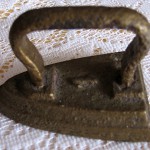Polish
Biecz, Malopolskie province, southern Poland
Warsaw, Poland on 11 November 1973
Sydney in November 1973
Husband’s home in Cardiff South, Newcastle after 2 weeks in quarantine
Depict (now Katies) clothing factory, Newcastle
T-shirt factory in Cardiff; Woolworths in Newcastle (both in NSW Hunter region)
My name is Anna Grenadier and my maiden name was Anna Zyrek. I was born on 2 January 1945 during the Second World War in a town in south Poland called Biecz. I was born on the floor in a community house and years later in that very room I taught my first class when I became a teacher! Biecz is a beautiful place; a very old town going back to the 14th century and I love it.
I have two brothers and sisters and a lot of friends in Poland. Because I was single and 28, I really had reasons to stay there. I was not looking for jobs or a better life or things like that.
Life is different in Poland. Your destiny is different. I was a teacher in Poland for seven years [in nearby Strzeszyn] and I travelled a lot during the school holidays. I had a good position at the school. My first trip was to Germany. The second trip was to Yugoslavia where I met a friend called Drago. Drago went to Australia and through him, I met my husband Stanislaw. We wrote to each other for two years and finally met in person when Stan came to Poland in 1973. We married in Poland the same year.
My husband came to Australia in 1949 and today he is 84 years of age. He came out with his first wife and child and they stayed at the migrant camp at Nelson Bay, near Newcastle. They had another two children, Peter and Michael. In 1959, he invited his parents to come out from Poland to live with them. His wife died at age 42 with heart problems in 1969. Years later, their son, Frank, also died from heart problems. There was a very strict divide between Australians and ‘New Australians’ back then in the 1960s. When those kids went to school they didn’t want to be called ‘wog’, they didn’t want to show that they were different.
I came to Sydney, Australia in November 1973 by plane. I wasn’t coming here to have a better life. It was destiny that brought me here.
I brought things out with me from Poland that are very special and could not be left behind. These are things that are meaningful to me. They remind you of your people and friends whom you love.
It is tradition in Poland that when you teach a school class for many years and you finish work, the schoolchildren give you a present. I brought this big, heavy crystal vase over to Australia because when I finished at the school to come to Australia my class gave this to me as a present. Other teachers gave me crystal glasses and a jug set as a wedding present.
This beautiful crystal plate is from my godmother and it was one of her wedding presents. My mother, Emilia, gave me this very small one-flower crystal vase and pressed dried flower; it is the only thing that I have from her.
When my father retired, he bought me a sewing machine and a huge dinner set. I couldn’t bring the sewing machine and I was trying to bring the dinner set but the Polish authority would not let me. They considered it to be a Polish antique and would not allow it out of the country. My sister now has it in her house, although I pinched one plate and two smaller salt and pepper plates. Every time we have family get-togethers or Christmas, these are on the table.
This book [of poems], Wiersze, is by Polish author Adam Mickiewicz. I bought it in Poland in 1973, before we were married, to give to my husband Stan.
Because I was pregnant with my son, Luke, and didn’t want to have any of the vaccinations [to get into Australia], I had to stay in quarantine for two weeks. It was very hot and I was only given tinned food. There were only three other people in the place while I was there, but my husband stayed with me because I could not speak English. I came straight here to Cardiff South, near Newcastle, after staying in quarantine and for me it was a big shock. I came from a European city to this small home and I could not communicate with Stan’s children. It was very hard and I rejected everybody. Stan wanted me to start to learn English and I said, “No way!” Our son, Lucas, was born in Newcastle in May 1974.
In 1975, I went back to Poland with Lucas to live for one year. When I went back, though, I felt like I had lost contact [with everyone]. I felt like I was now an outsider. I went on a holiday when I was in Poland with Lucas. I met two people there who changed my life. One was a young car accident survivor and he was in a hospital for about two years. He used a wooden piece to put in his mouth to stop him from screaming from pain. It took him one year to walk and he had no feeling in his hands. Before the car accident, he was a very good footballer.
The other person was a lady who was deaf and couldn’t speak but she was always happy. I said to myself here are these two people with these disabilities. Why am I whingeing? I think I made a decision then that it doesn’t matter what life gives you, you need to keep on going.
I came back to Australia in 1976 because Stan’s kids wanted me back. Another reason was that I felt that in the minds of the Polish people and my family, I was very rich. They did not understand that I was borrowing money to see them because I was so homesick.
After three years, Lucas went to school and I went to work and my English got better. This was a lifesaver for me. I started work in 1978 at Depict (now Katies) clothes factory in Newcastle because I was always good with my hands; I embroider a lot. Everything was cut and you only had to sew it together. We had a very nice small group at work and from this group of ladies we had twice yearly trips. Every week we would save $2 each. We went to places like the Snowy Mountains, Canberra and small trips like that on the weekends. This is how I started to see Australia. There were three ladies in this group who took me under their wing. We still have this friendship today, after 31 years!
In Australia, I always found a lot of good people. A lot of Australian people helped me through these years and are still helping. While working at Depict, I also started teaching Polish in the Polish Centre [in Newcastle]. A few years later, in 1985 or 1986, I was running the Polish School. When I finished at Depict, I worked for a small T-shirt factory in Cardiff. I worked there for three years and then another friend offered me a job in Woolworths. I still work at Woolworths in Newcastle.
I have been back to Poland three times and the last time was in 1991. I cannot leave my husband now and it is too much for him to go. My son, Lucas, has already been there twice. He is getting closer to his Polish family.
If I did not have my kids, Stan’s kids, I would not have survived. Stan’s kids helped me a lot, when I was up and down. There is much better communication now with my family in Poland because you have the phone and you have easier access to people; before it was very hard.
I think that a lot of satisfaction for me was organising things and teaching in school. After a few years off, I started to teach Australian children at St Kevin’s in Cardiff teaching the Polish language. The kids got to know some of the Polish traditions. When we meet, they always greet me in Polish, which gives me a lot of satisfaction.
At the moment, I am spending my time with my family. My sons and their families live very close. This is very important to me!
For a long time I used to think that my heart was still divided; half here and half there. But when I was in Poland last time, I missed my six grandchildren and my boys; I was too long away.
My heart is still there in Poland but home is here in Australia.



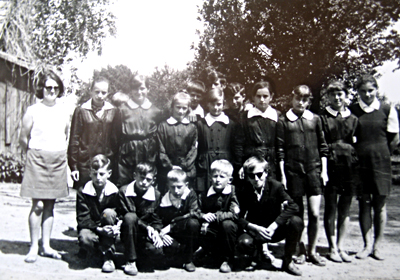


!["Before we were married, I bought this book [of poems] in Poland in 1973 to give to my husband."](../../../cms/wp-content/uploads/2009/09/grenadier-book-150x150.jpg)
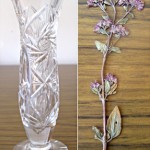
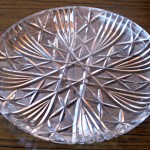
!["It is tradition in Poland that when you have a school class for many years and you finish work, the schoolchildren give you a present. When I [came] here, my class gave this to me as a present."](../../../cms/wp-content/uploads/2009/09/grenadier-vase-150x150.jpg)
